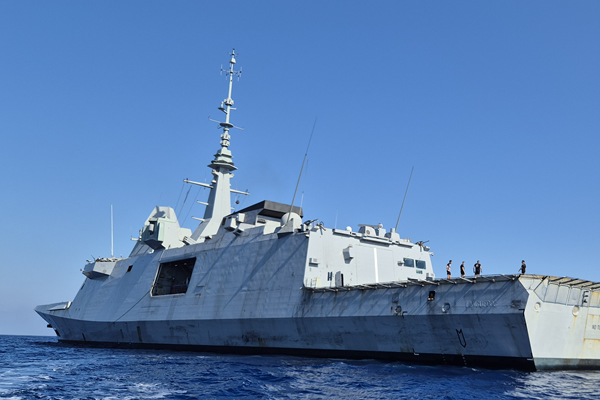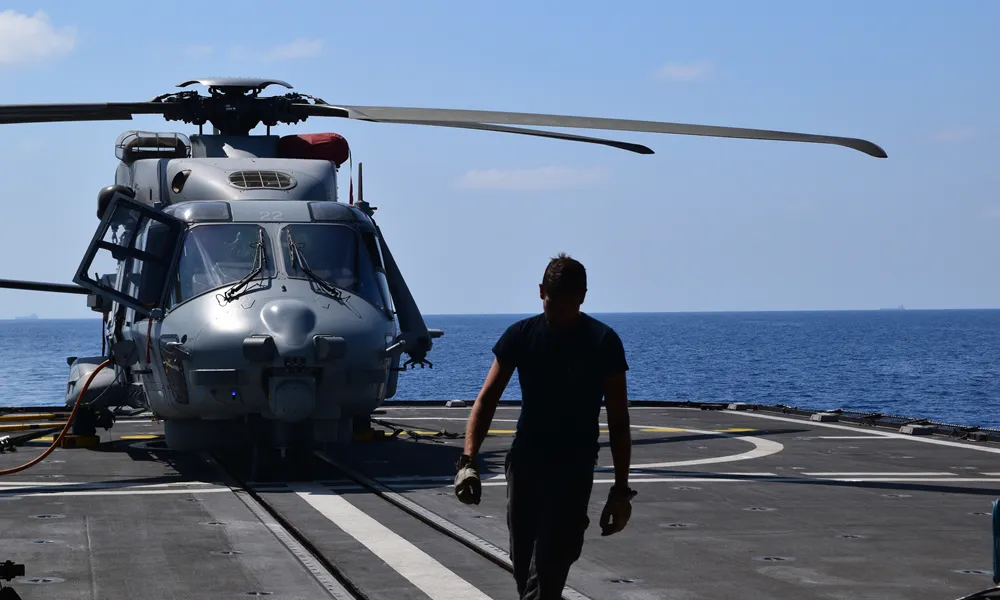Politis was invited to observe one day of the aeronautical exercise EUNOMIA on board the French frigate Languedoc and Cypriot Offshore Patrol Vessel (OPV) Ioannides on Wednesday.
The exercise involved the armed forces of Cyprus, France, Greece and Italy, including navy ships, fighter jets, helicopters, drones and a submarine. The purpose of the multinational exercise was to improve interoperability, and promote stability and freedom of navigation based on international law.
Ship’s captain says: drill, drill, drill
The French officer in charge of the 142-metre Languedoc, Captain Florian El-Ahdab, told Politis that operating at sea is very different to doing so on land, and much harder.
“The objective is to work and improve the interoperability of our forces […] and make sure that we know how to work together at sea, in a lot of different activities,” he said.
“You cannot take the interoperability of armed forces in general for granted,” he added.
The French navy officer noted that since the four participating nations share certain values, the respective authorities have agreed on the need to build this interoperability.
“If you don’t practice procedures, you can’t be sure how the other navy will interpret those same procedures,” said Captain El-Ahdab.
Commanding officers from the four navies share feedback at the end of the exercise to improve procedures and ensure they are ready to “plug-and-fight” if needed.

‘It never goes according to plan’
Captain El-Ahdab noted that a warship is “the most complex vehicle you can imagine” with a multitude of technologically advanced devices and installations.
Asked about the kind of missions the Languedoc has been on, Captain El-Ahdab said it is no secret that Aquitaine-class frigates are routinely deployed in the Red Sea as part of the EU naval mission Aspides, contributing to the protection of freedom of navigation and to safeguarding maritime security.
The main thrust of the mission is to escort vessels and protect them from incoming missiles. He noted that the Languedoc has had to use live fire on these missions to protect against attacks from Yemeni forces. Tackling incoming objects is considerably different to dealing with asymmetric threats like piracy. It shifts the mindset of the sailors and makes the usefulness of such exercises very apparent because they know they are drilling for something that might happen, said the captain.
“It never goes according to plan,” but you still must drill. One of the biggest enemies of all sailors is fire, he explained. So, you drill and drill and drill, but when the fire is real, “what usually takes five minutes, takes only one minute, because your body has memory.”

‘Landing a chopper at sea with 2.5m-high waves’
Speaking to Politis, the Caiman helicopter pilot said missions can involve anything from Search and Rescue, combat missions, anti-submarine warfare, surface-to-surface missions and more. While the Mediterranean is relatively calm, one of the hardest missions the pilot experienced was further north, trying to land the chopper on the frigate at night, using night vision goggles, and battling waves up to two and a half metres high.
One of the Cypriot participants in the multinational exercise noted that Cyprus may have limited naval presence and capacity, but it still had a role to play, utilizing its strengths where it can, something which its partners respected.
The French don’t judge the size of what you bring to the table, but what you can do with what you have, he said.
Contraband and weapons ‘seized’
During the eight-day aeronautical exercise, Politis also had the chance to observe up close the maritime intervention of the French and Cypriot vessels towards each other. First, the 62-metre Ioannides enacted a Visit, Board, Search and Seizure action against the Langeudoc, and then the French returned the favour with an inspection of the Cypriot vessel.
The sailors engaged in a spot of role play, first communicating to enquire as to the identity and purpose of the vessel in the region, and then boarding for inspection.

The Ioannides might not match the size of the frigates involved but makes up for that with speed and agility, capable of reversing course in the blink of an eye. The Cypriot vessel sent a VBSS team on a rigid inflatable boat (RIB) to the Languedoc, finding – as part of the exercise – an illegally held rocket-propelled grenade launcher.
The French then sent two RIBS to the Ioannides for boarding. After a thorough search of the vessel, they found drugs, hidden in a bell no less, and weapons in a storage container, as part of the simulated exercise.
The Greek and Italian vessels conducted the same exercise within a close distance from the French and Cypriot ships.
